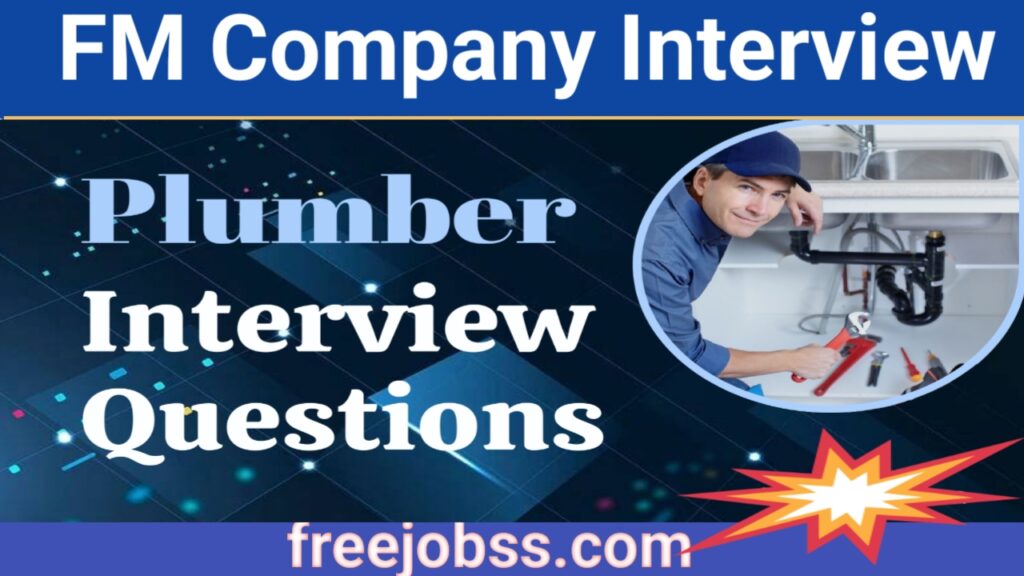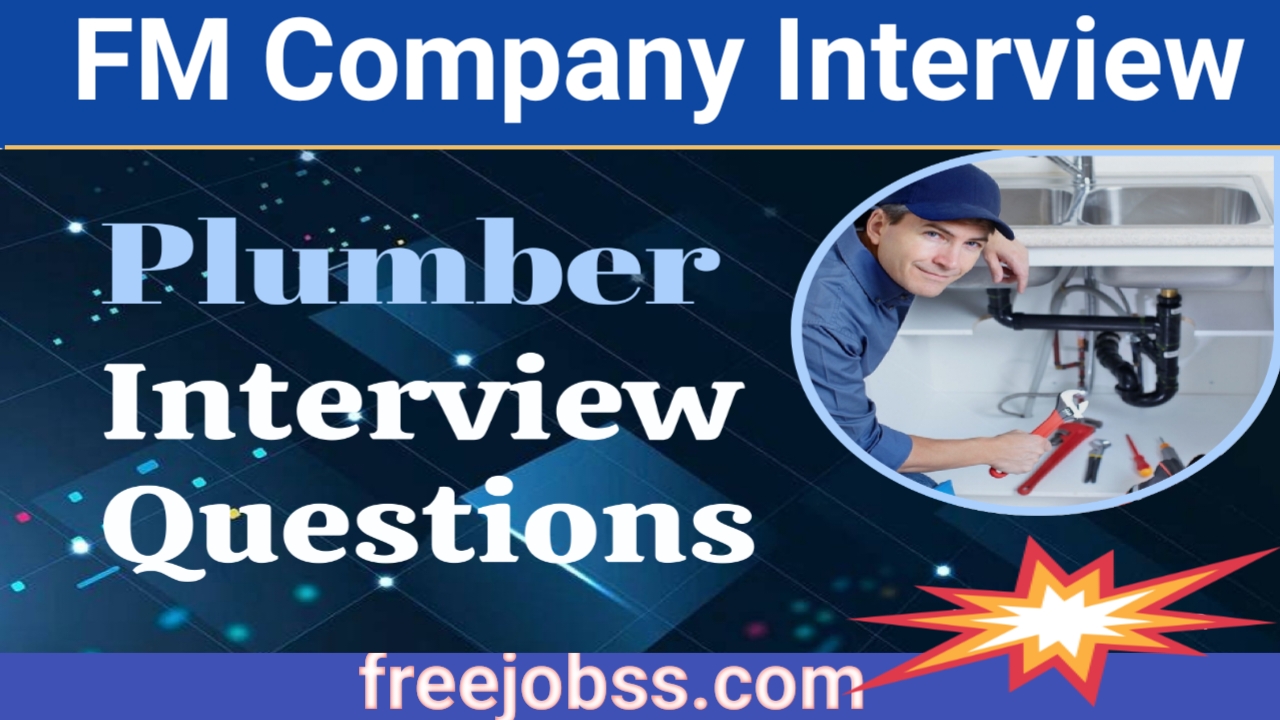Plumber Interview Questions in Facility Management Company
Hiring a plumber for a facility management company requires ensuring the candidate has the right mix of technical expertise, problem-solving abilities, and interpersonal skills. The following headings explore some of the key areas that interviewers might focus on when assessing potential plumbers.
Table of Contents
Technical Knowledge
When interviewing for a plumber role in a facility management company, technical knowledge is fundamental. Expect questions that delve into your understanding of plumbing systems, pipe installation, water supply, and drainage. Interviewers may also ask about specific tasks, such as installing fixtures or troubleshooting complex plumbing issues. You might be asked to explain how you would handle common scenarios, like dealing with clogs or leaks, and how you ensure everything is compliant with relevant building codes and standards.
Top 6 Question and answer
1.What types of plumbing systems have you worked with most frequently?Answer: I have worked extensively with both residential and commercial plumbing systems, including water supply, drainage, and gas piping. In my recent job, I handled plumbing installations and repairs in office buildings, dealing with larger scale systems like centralised heating and complex pipe networks.
2.How do you handle troubleshooting complex plumbing issues?
Answer: I follow a systematic approach: first, I identify symptoms, then isolate the problem by inspecting the relevant parts of the system. If needed, I use diagnostic tools like pipe cameras. I also rely on experience, ensuring I cover all possible causes before deciding on a solution.
3.Can you describe a recent project where you had to install or repair a major plumbing system? What challenges did you face?
Answer: Recently, I worked on a plumbing system upgrade in a large apartment complex. The challenge was to replace old galvanized pipes with copper ones while ensuring minimal disruption to the tenants. We implemented a phased approach to keep parts of the system operational while we worked.
4.What is your experience with commercial or industrial plumbing systems?
Answer: I have several years of experience working in commercial buildings, such as office towers and shopping centres. I’ve handled everything from restroom plumbing to complex HVAC water lines. I’ve also worked in industrial settings, maintaining large boilers and industrial-grade pipes.
5.How do you stay updated with the latest plumbing techniques and technologies?
Answer: I regularly attend training sessions, follow industry publications, and stay active in professional networks. I also take advantage of online courses and webinars to learn about the latest advancements in plumbing technology and materials.
6.Can you explain your process for ensuring that all work complies with local plumbing codes and regulations?
Answer: I stay informed about local plumbing codes by reviewing updates from relevant authorities and taking code refresher courses when necessary. Before starting any project, I ensure that all plans are compliant, and I always perform final inspections to verify everything meets the required standards.”

Problem-Solving and Experience
A facility management company often handles large commercial buildings or complexes, which can present unique plumbing challenges. Interviewers will assess your problem-solving abilities by exploring your past experiences. You might be asked about a difficult plumbing situation you’ve resolved, focusing on how you approach diagnosing problems, your decision-making process, and how quickly you can implement a solution.
Top 6 Question and answer
1.Describe a challenging plumbing issue you’ve encountered and how you resolved it.
Answer: One of the most challenging plumbing issues I faced was a recurring flood in the basement of a commercial building due to an overloaded stormwater drain system. After multiple attempts to fix it with temporary solutions, I realized the problem was systemic. I conducted a thorough inspection and found that the building’s drainage system was undersized for the volume of water runoff during heavy rainstorms. To resolve the issue, I recommended installing a larger stormwater pump and upgrading the drain pipes. This involved coordinating with the building’s management and contractors. After the upgrades, the flooding problem was eliminated.
2. How do you prioritize your tasks when multiple plumbing issues arise simultaneously?
Answer: I prioritize tasks based on urgency and the potential impact on safety and operations. For example, emergencies like burst pipes or gas leaks take immediate priority as they can cause significant damage and pose safety risks. For non-emergency tasks, I assess the complexity and customer needs, then create a schedule that addresses the most critical jobs first. Clear communication with the team and clients is key to ensuring expectations are managed, and deadlines are met.
3. What is your experience with preventive maintenance in a facility management setting?
Answer: I have significant experience with preventive maintenance in facility management. In my previous role at a large corporate office, I implemented a preventive maintenance schedule that included regular inspections of water heaters, boilers, pipes, and valves. I performed routine tasks such as flushing water heaters, checking for leaks, and ensuring that all systems were functioning efficiently. This proactive approach helped reduce emergency repairs and downtime, keeping the facility running smoothly and extending the life of the plumbing systems.
4. Can you describe your experience with plumbing in large facilities, such as office buildings or industrial complexes?
Answer: I have worked extensively in large facilities, including multi-story office buildings and industrial plants. In these settings, I’ve managed complex plumbing systems that required knowledge of high-pressure water lines, large drainage systems, and water heating equipment. I’ve also worked on projects involving the installation of industrial-grade pipes, maintaining HVAC water lines, and ensuring that all systems complied with local regulations. In these environments, attention to detail and coordination with other trades were crucial for successful outcomes.
5. How do you handle emergency plumbing situations, like burst pipes or major leaks?
Answer:In an emergency situation, my first step is to assess the situation quickly to determine the immediate actions needed to prevent further damage, such as shutting off the water supply. I then identify the source of the problem, whether it’s a burst pipe, a broken valve, or something else. I always carry emergency repair supplies, so I’m prepared to make temporary fixes right away. After stabilizing the situation, I work on a permanent solution. Throughout the process, I keep the client informed of what’s happening and what the next steps will be.
6. What is your approach to troubleshooting a problem when the cause isn’t immediately obvious?
Answer: When the cause of a plumbing issue isn’t immediately obvious, I start by gathering as much information as possible, asking questions about when the problem started, what symptoms have been observed, and whether there have been any recent changes to the system. I then conduct a systematic inspection, checking all the likely causes, and using diagnostic tools like pipe cameras or pressure gauges if necessary. If the problem is complex, I break it down step by step and work through the possibilities until I find the root cause. My goal is always to resolve the issue in a way that prevents it from recurring.
Customer and Team Interaction
Plumbing in a facility management company isn’t just about fixing issues; it’s also about working with a range of people, from building managers to tenants. You’ll need to demonstrate excellent communication skills and the ability to work within a team environment. Interviewers may ask questions about how you’ve handled customer complaints, managed expectations, or collaborated with other technicians on large projects.
1.How do you communicate with building occupants or facility managers when explaining a plumbing issue and the required repairs?
Answer: I make sure to explain the problem in simple terms, highlighting the impact and the solution. I also discuss the timeline for repairs and any potential disruptions to their activities, keeping them informed throughout the process.
2.How do you handle situations where your client or manager disagrees with your assessment or proposed solution?
Answer: I listen to their concerns and explain my reasoning in detail, using my experience and knowledge to back up my suggestions. If needed, I’m open to discussing alternative solutions and finding a compromise that satisfies both parties.
3.What’s your experience working alongside other trades, such as electricians or carpenters, on a job site?
Answer: “I’ve worked closely with other trades on many projects. Communication is key, and I always make sure we coordinate schedules and share information about potential conflicts, ensuring that the job site runs smoothly without delays.
4.How do you communicate with building occupants or facility managers when explaining a plumbing issue and the required repairs?
Safety and Compliance
Safety is a top priority in any facility management company, and plumbers must be fully aware of safety protocols. You can expect questions about your understanding of OSHA regulations, local plumbing codes, and safety practices, especially in busy or high-traffic buildings. Highlight your experience with following safety procedures and maintaining compliance on all plumbing projects.
Example question:
“What steps do you take to ensure that your plumbing work adheres to safety regulations and codes, especially in high-occupancy buildings?
Question: How do you ensure that your plumbing work adheres to safety regulations and compliance standards in a facility management setting?
Answer:In a facility management company, following safety regulations and compliance standards is paramount. I always start by reviewing the local building codes and ensuring that my work complies with those guidelines. Additionally, I follow OSHA regulations to maintain a safe working environment, whether that involves using the right personal protective equipment (PPE), securing the workspace, or safely handling hazardous materials. For example, when working in high-traffic areas, I ensure the area is clearly marked off to prevent accidents.”
Tools and Equipment
Your familiarity with plumbing tools and equipment will be a critical part of the interview. Facility management companies rely on plumbers who can quickly and efficiently diagnose and repair issues using the right tools. You should be prepared to talk about the specific tools you use regularly, your experience with advanced plumbing technology, and how you maintain your equipment.
1.What types of tools and technology do you use regularly in your work?
2.How do you ensure that your tools and equipment are well-maintained and in good working condition?
3.What are the essential tools you use regularly, and how do you maintain them?
4.Do you have experience using any advanced plumbing technology, such as pipe inspection cameras or water leak detection systems?
FAQs
1.What should I expect during a plumber interview at a facility management company?
Expect a mix of technical questions, problem-solving scenarios, and discussions on safety, teamwork, and customer service. Interviewers will want to know how you handle the unique challenges that come with managing plumbing in large commercial buildings.
2. How can I prepare for a plumber interview?
Review common plumbing issues that arise in facility management, stay updated on relevant codes and regulations, and be ready to share specific examples from your past experience that highlight your technical and interpersonal skills.
3. What makes a good plumber in a facility management company?
A good plumber in a facility management company combines strong technical knowledge with effective communication skills, problem-solving abilities, and a commitment to safety and continuous learning.

6 thoughts on “Plumber Interview Questions in Facility Management Company”